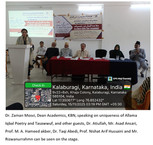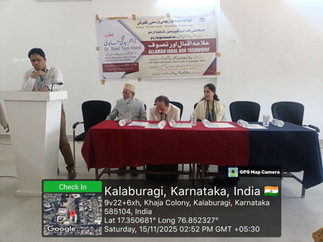Allama Iqbal aur Tasawwuf
- Nov 15, 2025
- 2 min read
Updated: Nov 19, 2025
On 15 November 2025, the Department of Urdu hosted an eye-opening seminar, “Allama Iqbal aur Tasawwuf,” at PG Building, FoL, 3rd Floor. The purpose of the seminar was to elucidate and dissect Iqbal’s nuanced engagement with Sufi thought, and to see in what way his rethinking of Tasawwuf as well as Sufi thought relates to contemporary moral and social renewal. The program was chaired by Prof. M.A. Hameed Akber and we were honoured by our chief guest, Dr. Syed Taqi Abedi from Canada, who, by his scholarship as an international, provided important perspective.
Dr. Abedi’s presentation traced Iqbal’s intellectual journey from classical influence of Sufism to a vigorous argument on behalf of Khudī — an active and self-assertive spiritual principle that urges ethical action in social behaviour. He conclusively situated passive or escapist readings of tasawwuf in juxtaposition to Iqbal’s exhortation to a revitalized spirituality that constructs responsible citizenship. The program included an invocation, recitation of poetry, and a group performance of an Iqbal poem by students to amplify the theme. Faculty and students engaged in a lively question and answer period; questions varied from textual interpretations to contemporary application of Iqbal’s thought.
A total of 68 individuals took part, which included 48 students, 12 faculty, and 8 external participants - demonstrating strong inter-departmental interest in the conducting of research. Attendees noted that the lecture was clear, the examples of applied research were relevant, and it was valuable to be involved in continuing discussion between old traditions and contemporary intellectual responsibilities. The main guest stated he was pleased to have the value of student involvement, and expressed that he would be willing to collaborate with the Department on additional academic exchanges in the future.
The event achieved meaningful outcomes for the Department. It provided an opportunity to engage with Iqbal's critique of traditional Sufism, highlighted the benefits of Khudī as a meaningful concept towards moral reconstruction, and actively inspired students to bridge the gap between their spiritual heritage and their modern academic responsibilities. Ultimately, the event added to the growth of the Department's mission of critical inquiry and cultural literacy in a way that enabled students to take the perspective of Iqbal with them and both engage as agents of transformative moral action.




























































Comments